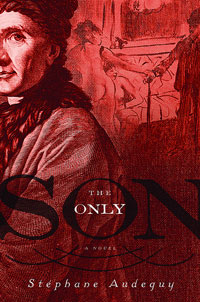The Only Son

It makes good sport to speculate on the men and women worthy of placement in the pantheon of world historical figures. In the 18th century and beyond, Swiss-born Jean-Jacques Rousseau, author of The Social Contract, has been awarded such stature—the French actually exhumed his body from Jean-Jacques’s chosen final resting place to lay him aside Voltaire and Descartes in their pantheon. Apparently, Rousseau had a little-acknowledged older brother François, who he mentions only twice in his magnum-opus memoir, Confessions.
In The Only Son (Houghton Mifflin Harcourt) Stéphane Audeguy (The Theory of Clouds) fabricates an autobiography of the elder Rousseau, who adopted the life of a libertine and was imprisoned in the Bastille—the Marquis de Sade was a fellow prisoner—for 27 years for making sex toys. He is liberated on that fateful day, July 14, 1789, which allows him a ringside seat to observe and critique the French Revolution in all its glory and dark excesses.
The story commences with the 90-year-old François’s attendance at his sibling’s reburial in 1794. Audeguy’s picaresque account of 18th-century French life is vivid, richly colored, and enhanced with dollops of humor. In one scene, François is involved in packaging rubble and miscellany from the demolished Bastille into patriotic souvenirs—scrap metal, papers, and cell doors—all very modern and of course the antithesis of his revered and anointed brother’s values and worldview. As a palatable mirror image of history, The Only Son issmart, great fun.
